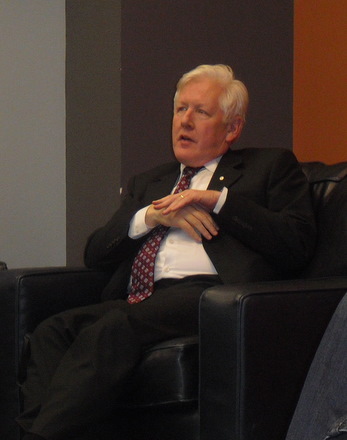Bob Rae Sees Tax Cuts As 'Pocketbook" Election Issue

Liberal Foreign Affairs Critic Bob Rae holds Q-and-A with UNBC students
Prince George, B.C. - Liberal MP Bob Rae is not willing to lay odds on when a federal election will be called, but says, "My view is we're already in an election, the only thing we don't know is an election date."
He says the campaigning has begun, but shrugs off a suggestion that his quick visit to Prince George yesterday was to appease supporters upset that Leader Michael Ignatieff chose not to visit the city during stops in 20 non-Liberal ridings over 11-days this month.
The Liberal Foreign Affairs critic says Canada is a big country and no one person can go everywhere. "I'm delighted to be here and the Liberal party will continue to be here -- we need to offer an alternative to people and we're going to continue to do that."
 Rae spent an hour-and-a-half in a town hall-style meeting with just under 20 students at UNBC in the early evening and was to have dinner with "a few local liberals" before flying back to Vancouver last night.
Rae spent an hour-and-a-half in a town hall-style meeting with just under 20 students at UNBC in the early evening and was to have dinner with "a few local liberals" before flying back to Vancouver last night.
He says even if there's no general election in the immediate future, there will have to be a by-election this spring to fill the vacancy left in the Prince George-Peace River riding by long-time Conservative MP Jay Hill. Rae says Hill's retirement presents an opportunity for new people to come forward. "People will make their choices based on those new faces and voices and I've never been one to say that we are not likely to do well in one place of the country or another -- we have to do well in more parts of the country, or we won't form a government, so we've got to look at these ridings as places where we need to grow and develop."
And the issue he feels that might draw local voters away from the Conservatives? "I think the corporate tax cut is a big issue," says Rae. "I think the fact the Tories have decided that they're going to continue to shovel money to, you know, the banks and the insurance companies and the oil companies and are not looking at the need to invest in infrastructure, are not focusing enough on the need to get our debt under control and the need to invest and help families -- I think that's a big issue."
"In a community like this, I think this is pretty much (sic) a pocketbook issue."
Previous Story - Next Story
Return to Home











A community like what?
One that wants the truth?..
One that is getting tired of empty promises?
One that seems to get the scraps to shut us up?
Go back to where you came from , and stay there as far as I am concerned.